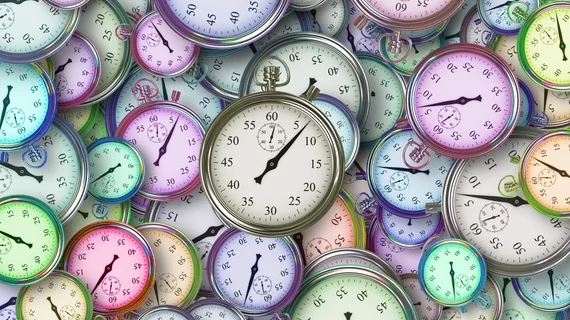~1 hour a day per radiologist: Time saved by workflow-integrated AI for chest CT
When AI-generated annotations of real-world chest CT images were made available to interpreting radiologists in a randomized prospective study, the assisted rads cut their read times from 421 seconds to 328.
The 93-second shave represented a mean reduction of 22% compared with radiologists unassisted by artificial intelligence in the trial.
The researchers estimate such automation—if integrated into other rads’ workflows, as in the study—would save close to one hour of interpretation time in a typical workday for a radiologist reading an average of 40 chest CTs per day.
Corresponding study author U. Joseph Schoepf, MD, and colleagues at Medical University of South Carolina describe their work in a report published June 15 in the American Journal of Roentgenology [1].
The AI software automatically analyzed cardiac, pulmonary and musculoskeletal findings, Schoepf and co-authors report.
The toolkit’s functions included labeling, segmenting and measuring normal structures as well as detecting, labeling and measuring abnormalities.
The AI-annotated images and auto-generated summary results were stored in the radiology department’s PACS and made available to interpreting radiologists, the authors note.
The patient sampling comprised 390 individuals (204 female, 186 male; mean age, 62.8±13.3 years) who underwent outpatient chest CT between January 19, 2021 and January 28, 2021.
Schoepf and team randomized scans equally between AI-assisted and non-AI arms. The team had each exam interpreted by one of the three cardiothoracic radiologists—65 scans per arm per radiologist, total of 190 scans per arm—who recorded interpretation times using a stopwatch.
Upon review, the researchers found mean interpretation times were significantly shorter for the AI-equipped arm than in the non-AI arm for all three radiologists.
In addition, the authors report, mean interpretation time was shorter in the AI-assisted arm compared with the non-AI arm for:
- contrast-enhanced scans (83 seconds),
- non-contrast scans (104 seconds),
- negative scans (84 seconds),
- positive scans without significant new findings (117 seconds) and
- positive scans with significant new findings (92 seconds).
In their discussion, Schoepf and co-authors state their study is the first they know of to put a workflow-integrated, AI-based chest CT support tool through its paces in a real-world clinical setting.
As workloads and burnout increase across radiology, they comment, “it has become apparent that novel solutions will be needed. One possible solution is to integrate AI support platforms into clinical radiology workflow. While incorporating AI into radiologists’ daily routines may require an initial learning curve, it may ultimately provide an effective tool for reducing the time and effort spent performing repetitive tasks.”
More:
If assistance from automated AI results can save one hour of interpretation time each day as estimated from our results, then radiologists could devote this time to other activities, whether additional clinical tasks such as communicating findings to patients and referring physicians, or administrative, education, and research responsibilities. Eventually, the adoption of AI -based solutions in scan reporting may decrease burnout and lower accompanying physical and mental exhaustion.”
More Coverage of Imaging AI:
4 increasingly common uses for imaging AI in the ED
Ultrasound-embeddable AI sharp at diagnosing clogged carotid arteries
AI mammography, prostate imaging algorithms cleared for market
AI reads of neck ultrasounds could displace thyroid biopsies
Artificial intelligence shows promise predicting patients’ need for CT after traumatic brain injury
Reference:
- Basel Yacoub, U. Joseph Schoepf, Tilman Emrich, et al., “Impact of Artificial Intelligence Assistance on Chest CT Interpretation Times: A Prospective Randomized Study.” American Journal of Roentgenology, June 15, 2022. DOI: https://www.ajronline.org/doi/abs/10.2214/AJR.22.27598

